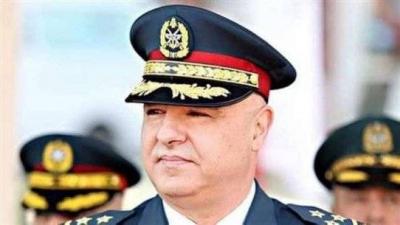The name of Army Commander Joseph Aoun appears on the list of candidates for the presidency, consistent with the history of army leaders in Lebanon who have earned the title of "His Excellency the General." The short distance between Yarze, where the Army Command and Ministry of Defense are located, and Baabda Palace is just a few kilometers. Since the election of General Fouad Chehab as president in 1958, who established a political school later known as Chehabism, Maronite army leaders have aspired to replicate this experience. After the election of President Aoun, General Joseph Aoun was the first candidate on his list to succeed Qahwaji as leader of the army. It is worth noting that both Qahwaji and the current army commander served under General Michel Aoun in the military.
Upon assuming the presidency, Aoun appointed Joseph Aoun as army commander, and the latter appointed Brigadier General Tony Mansour as the intelligence director, who was also close to the president. The Army's operation "Fajr al-Jroud" against terrorist organizations in 2017 contributed to strengthening the relationship between the army command and Baabda Palace. However, later disagreements began to surface between the presidency, army leadership, and the intelligence directorate, primarily due to the relationship between Minister Gibran Bassil and both the army commander—whom Bassil viewed as a likely candidate—and the intelligence director, neither of whom complied with Bassil's requests for many military appointments. The tensions escalated with the appointment of MP Elias Bou Saab, aligned with Bassil, as Minister of Defense, leading to numerous issues between him and the army leadership. The president refused to extend Mansour's term at the intelligence directorate, despite Washington's insistence on renewing it, especially since the appointment typically rests with the army commander, who usually consults the president.
The disagreements intensified during the Qabrshmoun incident (Summer 2019), caused by Bassil's visit to the Aley area, which led to provocations resulting in the deaths of two supporters of Minister Talal Arslan. Following that, the October 17, 2019 protests saw the army avoiding clashes with demonstrators and refraining from forcefully opening roads, including those leading to Jal el-Dib, Jounieh, and the coastal road to Batroun, Bassil's hometown. Amid the protests that severely impacted Bassil and the presidency, along with accompanying American sanctions on Bassil, General Aoun's standing increased by default. However, the biggest challenges faced by the army commander were in two areas: first, maritime border demarcation, where the army, tasked with indirect negotiations and preparing the demarcation file, insisted on point 29 at sea, but the presidential palace remained adamant on point 23, removing the file from the army's jurisdiction, especially after Bou Saab took on the task under President Aoun's orders. The second was the financial collapse affecting the institution and its military salaries, yet General Joseph Aoun worked on securing donations, including a recent Qatari grant providing $100 to each soldier for six months, pending the formulation of an international conference, sponsored by the UN, aimed at securing aid for the army. The army gained credibility during the Beirut Port explosion, as several nations insisted, in light of rampant corruption issues within the Lebanese authority, that the army should be the exclusive recipient and distributor of donations.
The army commander is keen to avoid involving himself in the presidential file, adhering to the tradition of army leaders to refrain from political statements or any presidential hints. The army commander's statements are usually made in front of his officers, and he surrounds himself with a close circle of politicians and advisors who usually provide insights in either concealed or overt manners. General Joseph Aoun does not deviate from the established relationship of his predecessors with the United States, which provides assistance and donations to the army, especially given that the institution's equipment is American, and the relationship is consistent, with the army commander frequently visiting Washington. However, any visit to any country during a presidential election period draws attention, as seen with General Aoun’s recent visits to Paris, Washington, the Vatican, and Iraq, all viewed as enhancing his future presidential position.
The army commander, like all candidates whose names have been put forward, awaits the end of the term to assess the situation. He understands that any decision regarding his move to Baabda Palace will not be local, despite his good relations with most parties, which have improved recently with Hezbollah, but remain complicated with the Free Patriotic Movement and have gone through a critical phase with the Marada Movement (led by Sleiman Frangieh). Thus, key voters have yet to make any decisions regarding the upcoming presidential elections. Until the presidential timing, the army commander will remain in the spotlight as one of the essential figures who will participate in managing the crisis, especially if forming a new government falters before the end of the month.




